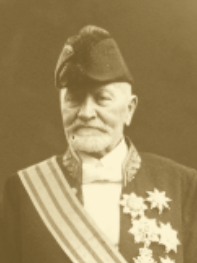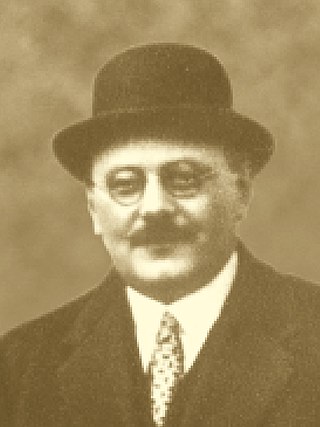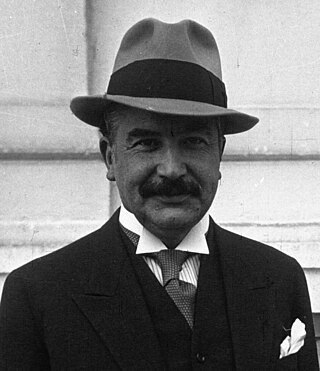Luxembourg is a parliamentary representative democratic monarchy, whereby the prime minister is the head of government, and the multi-party system. Executive power is under the constitution of 1868, as amended, exercised by the government, by the grand duke and the Council of Government (cabinet), which consists of a prime minister and several other ministers. Usually, the prime minister is the leader of the political party or coalition of parties having the most seats in parliament. Legislative power is vested in both the government and parliament. The judiciary is independent of the executive and the legislature.

The Luxembourg Socialist Workers' Party, abbreviated to LSAP or POSL, is a social democratic, pro-European political party in Luxembourg. The LSAP sits on the centre-left of the political spectrum.

The Democratic Party, is the major social-liberal political party in Luxembourg. One of the three major parties, the DP sits on the centre to centre-right, holding moderate market liberal views combined with a strong emphasis on civil liberties, human rights, and internationalism.
Elections in Luxembourg are held to determine the political composition of the representative institutions of the Grand Duchy of Luxembourg. Luxembourg is a liberal representative democracy, with universal suffrage guaranteed under its constitution. Elections are held regularly, and are considered to be fair and free.

Paul Eyschen was a Luxembourgish politician, statesman, lawyer, and diplomat. He was the eighth and longest-serving prime minister of Luxembourg, serving for twenty-seven years, 1888 until his death in 1915.

The National Union Government was a form of national government headed by Victor Thorn that governed the Grand Duchy of Luxembourg between 24 February 1916 and 19 June 1917, at the height of the First World War. At the time, Luxembourg was occupied by the German Empire, but the occupying Germans had promised not to interfere in the country's political machinations, provided that the Luxembourgish government did not aid Germany's enemies. Nonetheless, political life was dominated by the crisis that had enveloped Europe.

Pierre Prüm was a Luxembourgish politician and jurist. He was the 14th prime minister of Luxembourg, serving for a year, from 20 March 1925 until 16 July 1926.
The Party of the Right, abbreviated to PD, was a political party in Luxembourg between 1914 and 1944. It was the direct predecessor of the Christian Social People's Party (CSV), which has ruled Luxembourg for all but fifteen years since.

From August 1914 until the end of World War I on 11 November 1918, the Grand Duchy of Luxembourg was under full occupation by the German Empire. The German government justified the occupation by citing the need to support their armies in neighbouring France, although many Luxembourgers, past and present, have interpreted German actions otherwise.
The Liberal League was a political party in Luxembourg between 1904 and 1925. It was the indirect predecessor of the Democratic Party (DP), which has been one of the three major parties in Luxembourg since the Second World War.
The Independent National Party, abbreviated as PNI, was a populist political party in Luxembourg in the interwar period.

The first Juncker–Asselborn Government was the government of Luxembourg between 31 July 2004 and 23 July 2009. It was led by, and named after, Prime Minister Jean-Claude Juncker and Deputy Prime Minister Jean Asselborn.

The Werner-Cravatte Government was the government of Luxembourg between 15 July 1964 and 6 February 1969. Throughout its term, the Deputy Prime Minister was Henry Cravatte, replacing Eugène Schaus, who had been Deputy Prime Minister in the first Werner-Schaus Government. It was a coalition between the Christian Social People's Party (CSV), and the Luxembourg Socialist Workers' Party (LSAP).

The Bech-Bodson Ministry was the government of Luxembourg between 29 December 1953 and 29 March 1958. It was a coalition between the Christian Social People's Party (CSV), and the Luxembourg Socialist Workers' Party (LSAP).
The Dupong-Schaus Ministry was the government of Luxembourg between 1 March 1947 and 3 July 1951. It was a coalition between the Christian Social People's Party (CSV), and the Democratic Group.

The Prüm Ministry took office in Luxembourg on 20 March 1925. It was formed after the Chamber elections of 1 March 1925 and was supported by the Independent National Party, the Liberals, the Socialists and elements of the Party of the Right. It resigned on 16 July 1926, as the Liberals and Socialists could not agree over a bill for workers' holiday.

The Bech Ministry was the government of Luxembourg that came into office in Luxembourg on 16 July 1926 after the resignation of the Prüm Ministry, and was headed by Joseph Bech. It was reshuffled on 11 April 1932 and on 27 December 1936. It stepped down after the referendum on the so-called Maulkuerfgesetz, in which the majority of voters decided against the law.

The Reuter Ministry was the government in office in Luxembourg from 28 September 1918 until 20 March 1925, headed by Émile Reuter. It resulted from the Chamber elections of 28 July and 4 August 1918 and was reshuffled on 5 January 1920 as a result of the elections of 26 October 1919. There was a further reshuffle on 15 April 1921, when the Liberals left the government.
The Maulkuerfgesetz was a proposed 1937 law in Luxembourg. Officially, it was entitled the "Law for the Defence of the Political and Social Order" but was nicknamed Maulkuerfgesetz by its opponents. The law would have allowed the Luxembourgish government to ban the Communist Party and dissolve any political organisation which they believed might endanger the constitutional institutions. The members of these parties or organisations would be stripped of their political offices and could not be employed by the state or by local governments.











